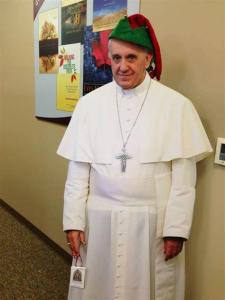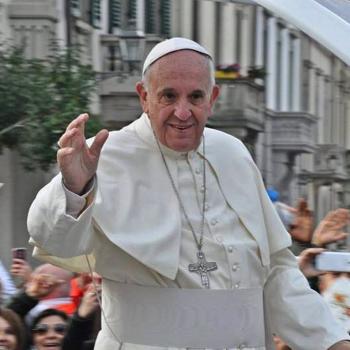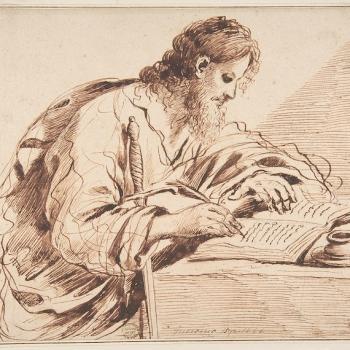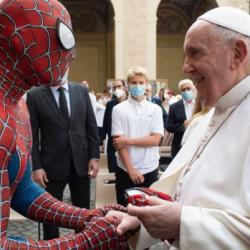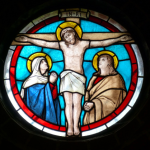On all days and at all times, dearly beloved, does the birth of our Lord and Saviour from the Virgin-mother occur to the thoughts of the faithful, who meditate on divine things, that the mind may be aroused to the acknowledgment of its Maker, and whether it be occupied in the groans of supplication, or in the shouting of praise, or in the offering of sacrifice, may employ its spiritual insight on nothing more frequently and more trustingly than on the fact that God the Son of God, begotten of the co-eternal Father, was also born by a human birth.
CHURCH FATHERS: Sermon 26 (Leo the Great) (newadvent.org)
The hut of Bethlehem is a school, in which if the fulfillment of the divine promises is not revealed to the wise and prudent of the century, but only to the parvoli, that is, to the simple shepherds, it is not because Jesus wanted to prefer one condition to another. The society of men is the work of God; God himself willed the diversity of conditions, and Jesus did not come to change this order by calling only the poor, but was born for everyone. So much so that to demonstrate this character of universality he wanted to be born in a public place, whose access could not be prevented to anyone, he wanted to descend from royal blood, so that the princes did not disdain him, he wanted to be born poor, so that everyone, without regard, could go to him, and to make himself all things to everyone, and no one was afraid to approach him appeared as a child.
To the members of the Roman Curia on the occasion of the exchange of Christmas wishes (December 23, 1903) | PIUS X (vatican.va)
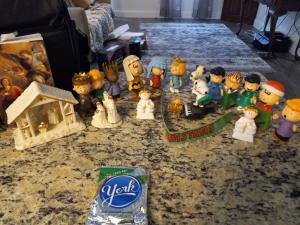
With the approach of the season of Christmas, commemorating the birth of Our Lord Jesus Christ, our thoughts spontaneously fly to the poor little children, especially in Central Europe, who are most cruelly feeling the wants of the necessities of life; and We embrace this tender age with all the more solicitude inasmuch as it more exactly recalls the image of the Divine Infant supporting for love of men in the cave at Bethlehem the rigour of winter and the want of all things. No other circumstance could be more opportune than this to induce Us to solicit for innocent children the charity and pity of Christians and of all who do not despair of the salvation of the human race.
Paterno Iam Diu (November 24, 1919) | BENEDICT XV (vatican.va)
Our best wishes for a Merry Christmas, of a happy New Year and of every good — just as you all desire, and not only for yourselves, but also for all the dear things and for all the dear people, which you carry in your thoughts and in your hearts.
With great to the Cardinals of the Holy Roman Church (December 24, 1938) | Pius XI (vatican.va)
As the Holy Christmas Season comes round each year, the message of Jesus, Who is light in the midst of darkness, echoes once more from the Crib of Bethlehem in the ears of Christians and re-echoes in their hearts with an ever new freshness of joy and piety. It is a message which lights up with heavenly truth a world that is plunged in darkness by fatal errors. It infuses exuberant and trustful joy into mankind, torn by the anxiety of deep, bitter sorrow. It proclaims liberty to the sons of Adam, shackled with the chains of sin and guilt. It promises mercy, love, peace to the countless hosts of those in suffering and tribulation who see their happiness Shattered and their efforts broken in the tempestuous strife and hate of our stormy days.
The church bells, which announce this message in every continent, not only recall the gift which God made to mankind at the dawn of the Christian Era; they also announce and proclaim a consoling reality of the present, a reality which is eternally young, living and lifegiving; it is the reality of the “True Light which enlighteneth every man that cometh into this World,” and which knows no setting. The Eternal Word, Who is the Way, the Truth and the Life, began His mission of saving and redeeming the human race by being born in the squalor of a stable and by thus ennobling and hallowing poverty.
Pope Pius XII on Christmas and Unity — Catholic Arena
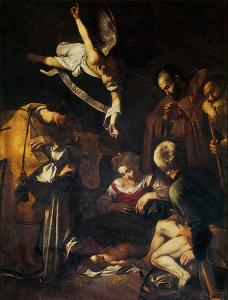
Christmas is with Us, the second Christmas of Our pontificate. Gazing at the scene from afar, united in spirit with Mary and Joseph on the road to Bethlehem, We taste a few days in advance the sweetness which comes to Us from the angelic hymn announcing the heavenly peace which is offered to all men of good will. And thus, from day to day, We reflect that the road to Bethlehem truly marks the path for the right approach to that peace which is on the lips, in the eager desires and in the hearts, of all.
Christmas Message (December 23, 1959) | John XXIII (vatican.va)
No one is excluded from the joy brought by the Lord. The great joy announced by the angel on Christmas night is truly for all the people, both for the people of Israel then anxiously awaiting a Savior, and for the numberless people made up of all those who, in time to come, would receive its message and strive to live by it. The Blessed Virgin Mary was the first to have received its announcement, from the angel Gabriel, and her Magnificat was already the exultant hymn of all the humble. Whenever we say the rosary, the joyful mysteries thus place us once more before the inexpressible event which is the center and summit of history: the coming on earth of Emmanuel, God with us. John the Baptist, whose mission is to point Him out to the expectation of Israel, had himself leapt for joy, in His presence, in the womb of his mother. When Jesus begins His ministry, John “rejoices greatly at the bridegroom’s voice.”
Gaudete in Domino (May 9, 1975) | Paul VI (vatican.va)
I am addressing this message to every human being, to man in his humanity. Christmas is the feast of man. A human being is born. He is one of the millions and millions of people who have been born, are being born and will be born on earth. A human being, one item in the vast range of statistics. It as not without reason that Jesus came into the world when a census ‘was being held, when a Roman emperor wanted to know the number of subjects in his territory. A human being is an object to be counted, something considered under the aspect of quantity, one of many millions. Yet at the same time he is a single being, unique and unrepeatable. If we celebrate with such solemnity the birth of Jesus, it is to bear witness that every human being somebody unique and unrepeatable. If our human statistics, human categories, human political, economic and social systems, and mere human possibilities fail to ensure that man can be born, live and act as one who is unique and unrepeatable, then all this is ensured by God. For God and before God, the human being is always unique and unrepeatable, somebody thought of and chosen from eternity, some called and identified by his own name.
It is as it was with the first man, Adam. It is as it was with the new Adam, born of the Virgin Mary in the cave at Bethlehem: “You shall call his name Jesus” (Lk 1:31).
“Urbi et Orbi”, Christmas Day 1978 | John Paul II (vatican.va)
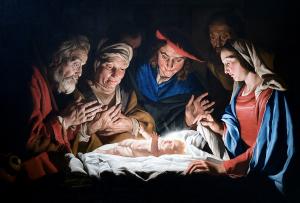
God’s sign is simplicity. God’s sign is the baby. God’s sign is that he makes himself small for us. This is how he reigns. He does not come with power and outward splendour. He comes as a baby – defenceless and in need of our help. He does not want to overwhelm us with his strength. He takes away our fear of his greatness. He asks for our love: so he makes himself a child. He wants nothing other from us than our love, through which we spontaneously learn to enter into his feelings, his thoughts and his will – we learn to live with him and to practise with him that humility of renunciation that belongs to the very essence of love. God made himself small so that we could understand him, welcome him, and love him. It is the Child of Bethlehem who is crying out to us; it is the God who has become small who appeals to us. Let us pray this night that the brightness of God’s love may enfold all these children. Let us ask God to help us do our part so that the dignity of children may be respected. May they all experience the light of l ove, which mankind needs so much more than the material necessities of life.
24 December 2006: Christmas – Midnight Mass | BENEDICT XVI (vatican.va)
To us a son is given. In the lowly manger of a darkened stable, the Son of God is truly present. But this raises yet another question. Why was he born at night, without decent accommodation, in poverty and rejection, when he deserved to be born as the greatest of kings in the finest of palaces? Why? To make us understand the immensity of his love for our human condition: even to touching the depths of our poverty with his concrete love. The Son of God was born an outcast, in order to tell us that every outcast is a child of God. He came into the world as each child comes into the world, weak and vulnerable, so that we can learn to accept our weaknesses with tender love. And to discover something important: as he did in Bethlehem, so too with us, God loves to work wonders through our poverty. He placed the whole of our salvation in the manger of a stable. He is unafraid of our poverty, so let us allow his mercy to transform it completely!
Holy Mass on the Solemnity of the Nativity of the Lord (24 December 2020) | Francis (vatican.va)
